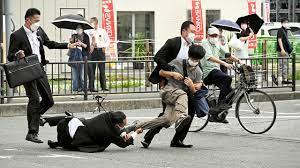
Putin Calls Abe's Assassination An 'Irreparable Loss'
Security guards tackle Abe's killer a 41-year-old ex-Japanese Navy man who used a hand-made pistol.
162Views 0Comments Posted 08/07/2022 Share| Share | ||
'I wish you ... courage in the face of this great irreparable loss,' Putin said in a condolence telegram addressed to the mother and widow of former Japanese Prime Minister Shinzo Abe, according to a Kremlin statement.
The Secretary-General of the North Atlantic Treaty Organization (NATO), Jens Stoltenberg, said he felt 'deeply saddened' by the death of Shinzo Abe, whom he referred to as a 'friend'.
'I am deeply saddened by the hateful death of Shinzo Abe, a defender of democracy and my friend and colleague for many years,' Stoltenberg said on Twitter.
Shinzo Abe deeply marked the political life of Japan and broke records as the longest-serving prime minister of his country, resisting various political and financial scandals.
Nearly two years after health problems forced him out of office, Abe, 67, died in Kashihara hospital hours after being shot during an election rally on the street in Nara, western Japan.
Abe was 52 when he became prime minister in 2006, making him the youngest person to hold the post.
He was considered a symbol of change and youth, but he also brought the pedigree of a third-generation politician, groomed from a very young age to wield power within an elite conservative family.
His first term was turbulent, beset by scandals and disputes, ending with his abrupt resignation.
He initially said that he was resigning for political reasons, but later admitted that he suffered from a health problem, which was diagnosed as ulcerative colitis. The ailment required months of treatment, and he got over it thanks to a new drug, Abe said.
The era of 'Abenomics'
He ran again, returning as a savior in December 2012, ending a turbulent when prime ministers succeeded each other at a rate of up to one a year.
Hit by the effects of the tsunami in 2011 and the subsequent Fukushima nuclear disaster, Japan found in Abe a reliable hand.
Abe became known abroad for his economic recovery strategy, known as 'abenomics', launched in 2012, in which he mixed monetary easing, massive budget recovery, and structural reforms.
It registered some achievements, such as an increase in women in the workforce and aid for the elderly. He also turned more heavily to immigration to deal with labor shortages.
However, in the absence of really ambitious reforms, this program was only partially successful, today clearly overshadowed by the economic crisis caused by the coronavirus pandemic.
Abe's great ambition was to revise Japan's 1947 peace constitution, written by the US occupier, and never amended.
On the international stage, Abe took a hard line on North Korea but assumed a role as a peacemaker between the United States and Iran.
He prioritized a close personal relationship with former US President Donald Trump to protect the relationship between the two countries from Trump's nationalism and sought to mend ties with Russia and China.
But the results were mixed: Trump insisted on forcing Japan to pay more for US soldiers based in the country; and, he failed to finalize an agreement with Russia on disputed islands.
Abe, often punctuated by scandals, knew how to take advantage of external events -- North Korean missile firings, natural catastrophes -- to divert attention and present himself as an indispensable boss in the face of adversity.

Legal Disclaimer:
MENAFN provides the
information “as is” without warranty of any kind. We do not accept
any responsibility or liability for the accuracy, content, images,
videos, licenses, completeness, legality, or reliability of the information
contained in this article. If you have any complaints or copyright
issues related to this article, kindly contact the provider above.

















Comments
No comment